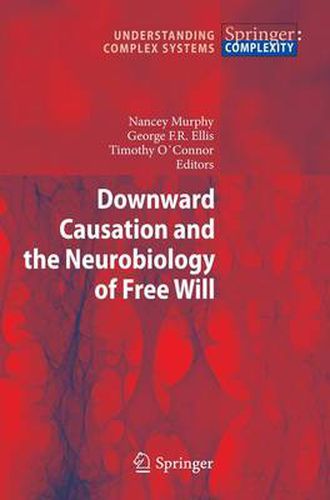Readings Newsletter
Become a Readings Member to make your shopping experience even easier.
Sign in or sign up for free!
You’re not far away from qualifying for FREE standard shipping within Australia
You’ve qualified for FREE standard shipping within Australia
The cart is loading…






This title is printed to order. This book may have been self-published. If so, we cannot guarantee the quality of the content. In the main most books will have gone through the editing process however some may not. We therefore suggest that you be aware of this before ordering this book. If in doubt check either the author or publisher’s details as we are unable to accept any returns unless they are faulty. Please contact us if you have any questions.
How is free will possible in the light of the physical and chemical underpinnings of brain activity and recent neurobiological experiments? How can the emergence of complexity in hierarchical systems such as the brain, based at the lower levels in physical interactions, lead to something like genuine free will? The nature of our understanding of free will in the light of present-day neuroscience is becoming increasingly important because of remarkable discoveries on the topic being made by neuroscientists at the present time, on the one hand, and its crucial importance for the way we view ourselves as human beings, on the other. A key tool in understanding how free will may arise in this context is the idea of downward causation in complex systems, happening coterminously with bottom up causation, to form an integral whole. Top-down causation is usually neglected, and is therefore emphasized in the other part of the book’s title. The concept is explored in depth, as are the ethical and legal implications of our understanding of free will.
This book arises out of a workshop held in California in April of 2007, which was chaired by Dr. Christof Koch. It was unusual in terms of the breadth of people involved: they included physicists, neuroscientists, psychiatrists, philosophers, and theologians. This enabled the meeting, and hence the resulting book, to attain a rather broader perspective on the issue than is often attained at academic symposia. The book includes contributions by Sarah-Jayne Blakemore, George F. R. Ellis , Christopher D. Frith, Mark Hallett, David Hodgson, Owen D. Jones, Alicia Juarrero, J. A. Scott Kelso, Christof Koch, Hans Kung, Hakwan C. Lau, Dean Mobbs, Nancey Murphy, William Newsome, Timothy O'Connor, Sean A.. Spence, and Evan Thompson.
$9.00 standard shipping within Australia
FREE standard shipping within Australia for orders over $100.00
Express & International shipping calculated at checkout
This title is printed to order. This book may have been self-published. If so, we cannot guarantee the quality of the content. In the main most books will have gone through the editing process however some may not. We therefore suggest that you be aware of this before ordering this book. If in doubt check either the author or publisher’s details as we are unable to accept any returns unless they are faulty. Please contact us if you have any questions.
How is free will possible in the light of the physical and chemical underpinnings of brain activity and recent neurobiological experiments? How can the emergence of complexity in hierarchical systems such as the brain, based at the lower levels in physical interactions, lead to something like genuine free will? The nature of our understanding of free will in the light of present-day neuroscience is becoming increasingly important because of remarkable discoveries on the topic being made by neuroscientists at the present time, on the one hand, and its crucial importance for the way we view ourselves as human beings, on the other. A key tool in understanding how free will may arise in this context is the idea of downward causation in complex systems, happening coterminously with bottom up causation, to form an integral whole. Top-down causation is usually neglected, and is therefore emphasized in the other part of the book’s title. The concept is explored in depth, as are the ethical and legal implications of our understanding of free will.
This book arises out of a workshop held in California in April of 2007, which was chaired by Dr. Christof Koch. It was unusual in terms of the breadth of people involved: they included physicists, neuroscientists, psychiatrists, philosophers, and theologians. This enabled the meeting, and hence the resulting book, to attain a rather broader perspective on the issue than is often attained at academic symposia. The book includes contributions by Sarah-Jayne Blakemore, George F. R. Ellis , Christopher D. Frith, Mark Hallett, David Hodgson, Owen D. Jones, Alicia Juarrero, J. A. Scott Kelso, Christof Koch, Hans Kung, Hakwan C. Lau, Dean Mobbs, Nancey Murphy, William Newsome, Timothy O'Connor, Sean A.. Spence, and Evan Thompson.